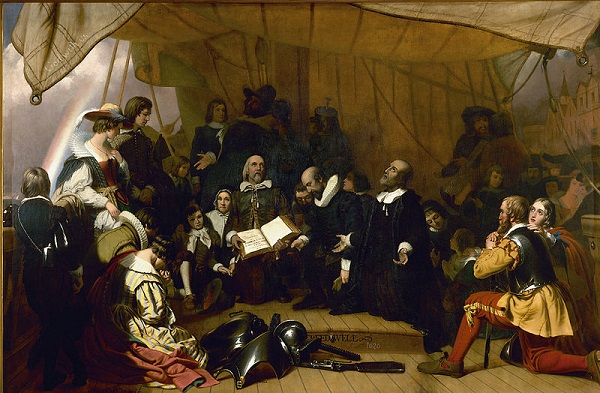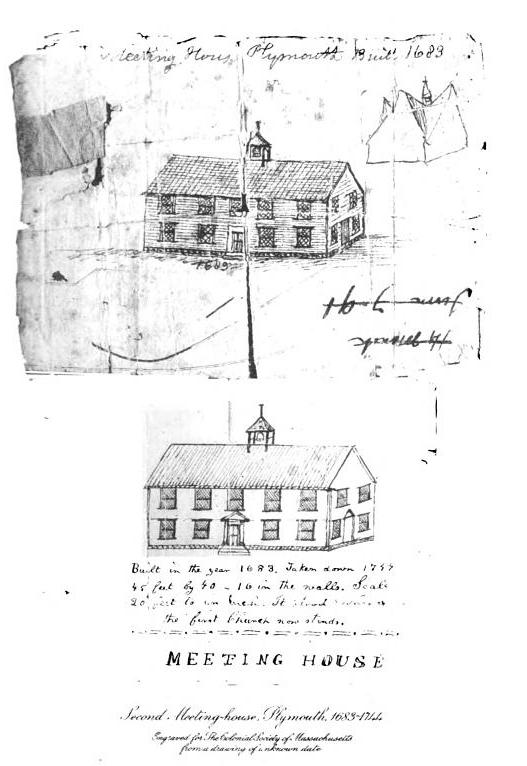The pilgrims of Plymouth Colony were religious separatists from the Church of England. They were a part of the Puritan movement which began in the 16th century with the goal to “purify” the Church of England of its corrupt doctrine and practices.
These separatists were a sect of Puritans within the movement who felt that the Church of England was too corrupt to save and had given up on the idea of real reform within the church and decided to separate from it.
At that time, the Church and State were one in England and the act of separating from the Church of England was considered treasonous. This is what prompted the separatists to flee England for Leiden, Holland in 1607.
To leave England at the time, you needed permission from the King. This permission was forbidden for religious dissenters so the pilgrims had to illegally smuggle themselves out of England by bribing ship captains to take them to Holland.

Embarkation of the Pilgrims, oil painting by Robert W. Weir, circa 1844
Although the pilgrims had religious freedom in Holland, they found it difficult to retain their English identity in a Dutch country, they worked grueling jobs in the cloth industry there and the possibility of war between Holland and the Catholic-run Spain, due to their 12 year truce nearing its end, threatened their future in the country. If Spain won the war and took over Holland, they knew that Protestants such as themselves would no longer be welcome there.
In addition to this, Separatist principles at the time included a separation between church and state as well as, for the more radical pilgrims, a separation from all other religious communities.
These economic reasons and religious reasons are what prompted the pilgrims to emigrate to North America in 1620. They hoped to not only find the religious freedom they were seeking in North America but also hoped to be able to earn money by establishing a colony there that would harvest supplies and send them back to England to be sold.
Yet, as radical as moving to the wilderness in search of religious freedom may seem, according to the Pilgrim Hall Museum Website, the Plymouth pilgrims were actually the least radical of the separatist movement:
“Our Plymouth forebears were among the least radical of Separatist groups. Though their Separatism represented a major difference between the Pilgrims and the non-Separatist Puritans who settled Massachusetts Bay, there was a strong enough friendship between the two groups that when a church was organized at Salem in 1629 – the second English congregation to be established on these shores and, of course, officially Anglican – Governor Bradford and some others made a perilous trip to Salem to ‘extend the right hand of fellowship, wishing all prosperity and a blessed success unto such good beginnings.’ Moreover, the Plymouth Separatists were willing to share in worship with other Christian groups, including the Church of England – an idea which had much to do with the controversy between the Pilgrims and one of their most famous ministers, Roger Williams.”
Not everyone in Plymouth Colony was a separatist. A number of people in the colony were non-separatists who came to Plymouth Colony for economic reasons.
The popular history book, Saints and Strangers by George Wilson, famously nicknamed these two groups of people as saints and strangers. The separatists were the saints and the non-separatists were the strangers.
There was friction at times between the saints and strangers, particularly after the Mayflower landed at Provincetown and some of the strangers began to question the saints’ authority there since none of them had legal permission to be there.
This friction is what prompted the pilgrims to draw up the Mayflower Compact as a way to unite the saints and strangers and keep the peace.

1683 First Parish Meeting House, Plymouth, Mass, illustration published in Plymouth Church Records, 1620-1859, Volume 22 By First Church of Christ Plymouth, Mass., 1920
Other times that the saints and strangers quarreled due to their religious differences was during the Christmas holiday. The saints didn’t recognize or celebrate Christmas because they felt it was more of a Pagan holiday than a Christian holiday.
The non-separatists didn’t agree and when they refused to work on Christmas day and were found playing games in the street Governor William Bradford took their games away and stated:
“that was against his conscience, that they should play and others work. If they made the keeping of [Christmas] a matter of devotion, let them keep their houses; but there should be no gaming or reveling in the streets.”
The saints also rejected Easter and the various Saints Days because they believed they had no scriptural basis. For this same reason, they also rejected hymns, the recitation of the Lord’s Prayer and creeds. Psalms were the only music allowed in service and the pilgrims customized them for their congregation, according to an article on Plimoth.org:
“The versions of the Psalms used in Plymouth Colony came from Henry Ainsworth’s Psalter, in which he had ‘Englished’ the Psalms in prose and metre, and set them to livelier music than had been heard before. These were sung, without musical accompaniment, by the whole congregation. Years later, in the 1670s, when the first generation of settlers – many of whom had musical training – had died, the colonists had difficulty with the music of the psalms. At this point, the practice of ‘lining’ psalms began. In lining, each line of the psalm is first sung by the Pastor, then repeated by the congregation.”
Sabbath services were held twice on Sunday, from 9am to noon and from 2pm to 5pm, and sermons were often given on Thursdays and when Days of Thanksgiving or Days of Fasting and Humiliation were proclaimed.
Days of Thanksgiving and Days of Fasting and Humiliation were religious days where the puritans would spend all day fasting and praying, usually due to a problem or conflict they were facing at the time.
The seating arrangement of the Plymouth meetinghouse was organized by gender with the men and boys 16 years and older sitting on one side of the meetinghouse and the women and children on the other.
William Brewster had served as the Ruling Elder of the Pilgrim church since their early days in England and continued to serve in Plymouth Colony. Ruling Elders were in charge of the government of the congregation but because they were not ordained ministers they could not deliver the sacraments.
When the pilgrim’s Pastor Robinson remained in Holland and did not travel to Plymouth with the colonists, Brewster preached and taught the pilgrims in Plymouth.
Although the pilgrims were considered more tolerant than their fellow Puritans who settled Massachusetts Bay Colony, they weren’t that tolerant. In 1632, a preacher named Roger Williams came to Plymouth after leaving the Massachusetts Bay Colony due to disagreements over religious beliefs. He served as Plymouth’s pastor for a while but soon left when he felt that the pilgrims’ beliefs were not as pure as his own.
Williams ideas were somewhat radical, even for purists like the pilgrims. Bradford and Brewster had disagreed with Williams over many things such as William’s belief that it was wrong for a pastor to administer an oath to an “ungodly” man and his belief that the practice of infant baptism allowed people who were not chosen by God to enter the church.
Williams was disappointed by the pilgrims and left Plymouth after he was invited to become the pastor at a church in Salem, Mass. Bradford described Williams in his diary, which was later published under the title Of Plymouth Plantation:
“Mr. Roger Williams, a man godly and zealous, having many precious parts but very unsettled in judgement…He this year [1633] began to fall into some strange opinions, and from opinion to practice, which caused some controversy between the church and him. And in the end some discontent on his part, by occasion whereof he left them something ubruptly…But he is to be pitied and prayed for; and so I shall leave the matter and desire the Lord to show him his errors and reduce him into the way of truth and give him a settled judgment and constancy in the same, for I hope he belongs to the Lord, and that he will show him mercy.”
Both the Massachusetts Bay Colony and Plymouth Colony reacted strongly to the influx of Quakers to their colonies in the 1650s and 1660s. Massachusetts Bay whipped, banished and hanged Quakers while Plymouth Colony fined, whipped and banished Quakers but refrained from hanging them.
At first, Plymouth Colony’s government and its religion were only somewhat entwined but the colony slowly increased its legislation on religious duties and morals over time.
A bill passed in 1650 made it a crime to slander a church or minister. There were also bills passed that required a fine of ten shillings or a whipping for anyone who profaned the Sabbath. A bill passed around this time also made church attendance mandatory.
With the 1685 codification of laws, even more laws were passed concerning religious and moral conduct.
These religious-based laws eventually came to an end after Plymouth Colony was merged with the Massachusetts Bay Colony in 1691 and became a royal colony.
Sources:
Bradford, William. History of Plymouth Plantation. Edited by Charles Deane, Privately Printed, 1856.
“”Faith of the Pilgrims.” Plimoth Plantation, www.plimoth.org/what-see-do/17th-century-english-village/faith-pilgrims
“Religious Controversies in Plymouth Colony.” Pilgrim Hall Museum, www.pilgrimhallmuseum.org/pdf/Religious_Controversies_Plymouth_Colony.pdf
